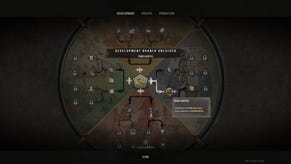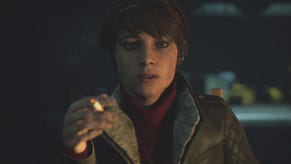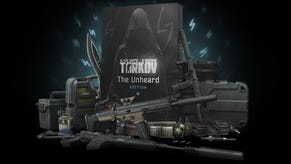The Sunday Papers
Sundays aren't often for sun, as the name would suggest, but on the rare occasion when the beams of atomic light do make it past the cloud cover, it's worth enjoying. Perplexingly, though, my laptop screen is hardly visible in the sunshine, meaning I must retreat to my cave for the study of important videogame links and literature. Hm.
- Matthew Burns on the "Dumbness" debate: "Another way of saying this is: it is extremely difficult— maybe impossible— to come up with a story and characters that, when placed within the context of most current video games, don’t feel inherently silly." And another perspective from The Guardian.
- Kim Swift talks Quantum Conundrum and "animal instincts" with Gamasutra: "I would say it takes place more in the player's brain than it actually does on the screen, because people's interpretations of what actually happened are wildly different from everybody else. Like using Portal as a for instance, hearing one person's take on what the story of Portal versus somebody else's take can be extremely different -- versus what we actually had in mind. And I think that's a good thing. I think players should impress themselves onto the game world, and I think it makes it more immersive, and makes it more fun, and I know I do that."
- Rich Stanton on Free Radical: "Second Sight was released in August 2004, and its final form eschewed Ian Livingstone's demons in favour of a unique combination of stealth action and psychic powers. "It was unfortunately timed," says Doak. "I mean what are the chances of people making two Asteroids Hit the Earth movies in one year? Must be a million to one! But there you are. And Psi-Ops came out at around the same time, and that blew our US sales out of the water. You could do more violent things in it like explode people's heads." The sales were far from stellar."
- In light of the recent Geoff Dyer book, which apparently ignores the videogame entirely, the New York Review Of Books takes a look at the Tarkovsky/Stalker connection, and for a counter-point read my own piece on the same subject.
- RPS chum Mitu Khandaker published her correspondence with Emily Flynn-Jones, in which they discuss gender issues in gaming, particularly the "maleness" of gaming, starting at the beginning: "I guess I want to start by offering a summary of reasons that I find myself conflict and want to engage with gender issues in games, or HOW I SUDDENLY REALISED I AM A GIRL." Later: "Basically, what I am trying to say, is that I am throwing my hands up when it comes to asking: what is ‘femininity’? Because, I’m sure I have no idea. Like you, when I was tiny, I had an aversion to ‘pinkness’, and I didn’t feel nearly as comfortable in dresses as I did slobbing around in jeans. But then again, I did not feel an explicit desire to be anything but female. There is SO much more nuance here, but in conjunction with the other ‘male’ traits of my personality, and my hobbies, I guess I might have understood this as overcoming what was ‘expected’ of me as a girl growing up. As I’ve gotten older, though, I’ve re-embraced feminine clothing, reconciling these various parts of myself."
- Killscreen on how the non-linearity of games is not a unique property, and further logical extensions from there: "If we primarily think in terms of whether a text is linear or not, we neglect to think about how nonlinearity works. It is precisely the eclecticism of the works touched on in the tiny sampling above that shows the poverty of thinking too linearly. In fact, even utilizing the terms “linear” and “nonlinear” vitiates the debate by making it seem as if there are only two kinds of objects under examination when there are in fact many. Linearity attains a normative status, while nonlinearity is simply a departure therefrom. This puts dismayingly arbitrary limits on both the creative range of artists and our ability to critique their works. There are many ways in which artworks organize temporal and spatial experience, not just two."
- Nick Wheeler meditates on whether a mod "fixes" Mount & Blade: "It wasn’t until our third attack on a simple trade caravan that I began to start questioning his motives. Every battle, he’d charge ahead of us on his war-horse and set about slaughtering the relatively defenceless peasants with relative glee. On several occasions, by the time we reached their position the enemy lay dead, victims of Gerlad’s viscious blade. Covered head to toe in the blood of men and women alike, he would hold his axe aloft and cheer for his accomplishments."
- A review of Anna Anthropy's Rise of the Videogame Zinesters: "So I am not too sure about Anthropy’s assessment that a game needs to be authored by one person to most closely approximate a truth. I’m not sure books or zines need to be authored by one person. I’m not sure paintings need to be authored by one person. And in fact, videogames might be the one medium that benefits most from the creativity of the hive mind."
- The metaphor of killing pervades gaming, even outside of the game mechanics. I think that's the point of this article: "When publishers use the language of combat so openly to describe a mere sales contest, it inevitably bleeds into a wider context. Maybe this time might be better spent on actually making the games, rather than boasting about their retail slaying prowess. Like a skilled Civilization player, it's possible to win through construction and development as well as outright conquest. Some people just like to start a war."
- Eurogamer provide the "Ultimate Retro Console Collector's Guide", which details collection the various older generations of consoles. Here's my guide: Be a gamer in your mid-Thirties, and you probably already have most of these machines. Sigh.
- "Automated, deep natural-language understanding technology may hold a solution for more efficiently processing text information. When processed at its most basic level without ingrained cultural filters, language offers the key to understanding connections in text that might not be readily apparent to humans. Sophisticated artificial intelligence of this nature has the potential to enable defense analysts to efficiently investigate orders of magnitude more documents so they can discover implicitly expressed, actionable information contained within them." Crikey.
- Fileplanet appears to be over.
Music this week is a delightful summery pop-piece by Northumbria.









